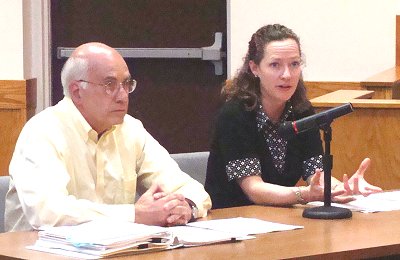- By Dan Veaner
- News
 Print
Print  As the Lansing Town Center idea has been gaining traction, different people have been working on key elements that will insure it is successful. The Lansing Town Center committee met with residents and came up with conceptual plans for the center. Its chair, Councilwoman Kathy Miller is consulting with the NYS Department Of Transportation to find grants for building sidewalks. Town officials are pursuing a new sewer option, the Lansing Recreational Pathways Committee opened a trail last winter, and the Economic Development committee has been exploring ways to attract businesses to the site. A key element of this effort is the formation of a Lansing Town Center Incentive Zone, which, if accepted, would provide tax abatements to help developers bring businesses and not-for-profits to the town center.
As the Lansing Town Center idea has been gaining traction, different people have been working on key elements that will insure it is successful. The Lansing Town Center committee met with residents and came up with conceptual plans for the center. Its chair, Councilwoman Kathy Miller is consulting with the NYS Department Of Transportation to find grants for building sidewalks. Town officials are pursuing a new sewer option, the Lansing Recreational Pathways Committee opened a trail last winter, and the Economic Development committee has been exploring ways to attract businesses to the site. A key element of this effort is the formation of a Lansing Town Center Incentive Zone, which, if accepted, would provide tax abatements to help developers bring businesses and not-for-profits to the town center."It's tough enough to develop anyplace now, because of all the rules and regulations and restrictions," Lansing Economic Development Committee Chair Andy Sciarabba says. "Especially in a community that hasn't got all that large a population base that's been struggling to entice developers to our community. It's a way to say we want you to develop here in this area."
Last year Sciarabba and Tompkins County Area Development (TCAD) Director Of Economic Development Services Heather Filiberto approached the Town Board about forming an incentive zone for the proposed town center. The board asked them to develop the idea further, and they were back in May to present a proposal that will offer tax incentives to qualifying businesses and not-for-profits in the zone that will help make their development feasible. This May they asked the Board to approve a detailed proposal.
The proposal is to promote light industrial, mixed use development and rental housing within the town center boundaries. Qualified project developers would be told about the incentive zone when they begin working with the Town Planning Department, and would apply to the Tompkins County Industrial Development Agency (IDA) with a special town pre- application outlining the proposed project's benefits to the community, and a detailed description of the project. The IDA would partner with the Town. The Town Board would pass a resolution telling the IDA that they want to see a project receive some sort of incentive.
"We tried to come up with the most efficient and non-time consuming process we could," Filiberto says. "When a developer is ready to go and they're working through the other town processes of zoning and permitting, that it's not onerous and time consuming so it won't make them have to wait for the next consturuction season or anything like that."
In many ways the pre-application prepares the developer for the IDA application. It asks for a lot of the same information. But it adds a key benefit: if the Town Board approves the project, the municipality's weight is added to the application send to the IDA.
 Lansing Economic Development Committee Chair Andy Sciarabba and TCAD Director Of Economic Development Services Heather Filiberto presented a Lansing Town Center Incentive Zone proposal to the Town Board in mid-May
Lansing Economic Development Committee Chair Andy Sciarabba and TCAD Director Of Economic Development Services Heather Filiberto presented a Lansing Town Center Incentive Zone proposal to the Town Board in mid-MayThat was exactly what Sciarabba and Filiberto asked the board to do with their proposal. With the endorsement of the Town Board they hope the IDA will accept the proposal and officially create the incentive zone. There is precedence for such a zone in Tompkins County. The IDA already works with the City of Ithaca on its similar Downtown Density Program, which requires a minimum number of public benefits to qualify for IDA consideration.
If the incentive zone is created projects approved by the Town would go to the IDA, which could choose four courses of action: 1) they could approve a property tax abatement on the increase of the assessment, 2) a sales tax abatement on construction material and furniture and fixtures related to that project, and 3) a partial mortgage recording tax abatement which is $2.50 per $1000. Of course the fourth option would be to deny the request. But Town approval would increase the chances of obtaining one or more of the three benefits.
A project applying for incentives would not be subject to different zoning or building rules. Sciarabba is careful to note that town procedures already in place involving planning and permitting of projects, meeting Town law, working with the Planning Board, and so on would remain as they are. Applying for incentives would take place at the same time and would not affect the scope and plan of the actual project as far as the Town is concerned. It could be constructed without the incentives if the contractor chooses to go forward with it at that point.
"That would be concurrent with the regular planning process," Sciarabba says. "There is no change in the Town planning process whatsoever. The ultimate decision, the planning board review... nothing changes there. It all stays the same."
If a company does not meet its obligations it can be required to remit payment and interest on all the incentives they have received, which are sent back to the taxing authorities they are owed to. This year Emerson Power Transmission Company paid back $260,000 incentives. They had received them on the condition of creating jobs at the Ithaca plant. When they closed that plant the jobs went with it.
Recently the IDA has been expanding the kinds of economic incentives it is willing to consider. While it was limited to industry, they have recently granted incentive agreements to two grocery store projects, and the BJ's/Senior Housing project being constructed this year at the Shope At ithaca mall property.
Sciarabba says the County is supporting development in the rural areas, citing his own grocery store project as an example of a project they were willing to support. Part of the reason that tax abatement was approved was that Sciarabba and his team were able to demonstrate community benefits, including that there isn't an existing grocery store in the town, and that residents want one close by.
"An incentive zone takes that one further," Sciarabba said. "It allows us to consider other things like medical offices, other retail businesses, mixed use housing, manufacturing and assembling. It gives us the tools that we really need to make our town center a reality in the community. This program is critical to achieve that."
If the IDA approves the Lansing incentive zone, it will bring benefits to the County as well as the Town. A major problem that Lansing taxing authorities are now facing is that virtually all of its business property tax eggs are in the AES Cayuga power plant basket. A Payment In Lieu Of Taxes (PILOT) agreement with that company that sets the valuation of the property years in advance has now been renegotiated downward twice, at great cost especially to the Lansing School District. Spreading business property taxes among many smaller businesses in the town will have the same effect as diversifying investments, providing more stability and eventually taking some of the tax burden off of homeowners.
Last month the Town Board approved the proposal unanimously.
"We certainly should look at our comprehensive plan again," added Lansing Town supervisor Scott Pinney. "This could really change the whole landscape of the town."
v7i21



